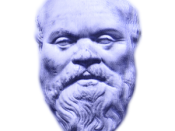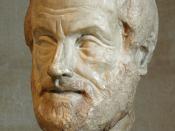In this paper, I will set out Aristotle's conception of "wisdom" (sophia), as compared to the modern American conception of the same word. I will then discuss some of the problems of Aristotle's approach to and concept of "wisdom."
One of the most fundamental concepts in Aristotle's Metaphysics is "wisdom" (sophia). It is so fundamental that the whole discipline to which Aristotle devoted his life that it is called "philosophy," i.e. the "love of wisdom." Accordingly, when we study the philosophy of Aristotle, it is crucial that we understand exactly what he meant by sophia, and not confuse his concept with ours today.
An American in 2001 C.E. would probably conceive of "wisdom" in a number of ways. On a very basic level, he would probably have in mind the archetypal cartoon-character "wise man" - an old thin long-bearded man sitting on some sort of throne, basking in the glow of knowledge, experience, and good judgment.
Such caricatures clearly affect the common representations of, for example, the Magi. Indeed, American popular culture often depicts the "wise man" as someone with a unique insight into the meaning of life, or some similarly profound topic, who resides alone on some mountain peak in an exotic Eastern country, or something to that effect.
If we examine these popular caricatures, a surprisingly complex concept of "wisdom" emerges. The modern American "wise man" is, of course, very learned in a large number of fields. But he also has sound judgment, good ethical sense, and a good understanding of human nature. Such "wisdom" is not merely the result of introspection and formal education, but of worldly experience. In fact, today we often speak of the "educated idiot" - a person who has a great deal of theoretical knowledge but lacks common sense, social skills, or...



Aristotle
Prettty good essay i used it in my hist 300 class and received a b
4 out of 4 people found this comment useful.